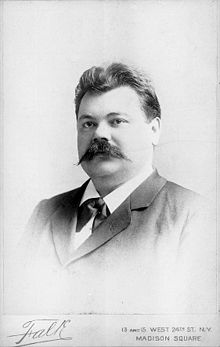All right, so it's not so well known. March 17th, as everybody knows, belongs to the Irish, and Jews have got nothing that can remotely compete with expelled snakes and shamrock shakes. The Irish have got green rivers, and what have we got? Joan Rivers.
But at least, we’ll always have Halévy.
Halévy who? Why, Jacques-François-Fromental-Élie Halévy, of course: French composer, father-in-law of Carmen composer Georges Bizet, and himself responsible for a hit opera called La Juive (The Jewess.) In today’s edition of Israeli newspaper Haaretz, we learn that Halévy died on March 17th, 1862. And this is what got me thinking.
La Juive is not an opera I've ever played in the orchestra for, nor am I even slightly familiar with it. But Halévy is of interest to me for another reason: his life is an example of a pretty intriguing pattern.
According to Ha-aretz’s David B. Green, "He was usually known as Fromental Halévy, because the day he was born, May 27, 1799, was the feast day of Fromental, 'oat grass' in French, in the French Republican calendar. His father, Elyahu Halfon, was a German Jew who changed his name to Elie Halévy when he moved to Paris. There he worked as a cantor …"
It’s a funny thing: a whole lot of notable Jewish classical musicians were the sons of either cantors or klezmers. In Western Europe from earlier in the nineteenth century, and in Eastern Europe beginning a little later, the same thing kept happening: arts and skills learned in the course of Jewish observance (klezmer was very much a part of Jewish observance) came to serve, with the shifting of cultural borders, as passports to a very different world.
Did I say something about high culture? Never mind. You maybe remember Stephanie Zimbalist from Remington Steele ...
She was the daughter of Efrem Zimbalist Jr. …
… who was the son of Efrem Zimbalist, one of the first Russian-Jewish violinists to become a big star in America (following his 1911 debut.) He later became head of the prestigious Curtis Institute in Philadelphia, where he taught my violin teacher Shmuel Ashkenasi. Here's Zimbalist with his wife, in a mash-up that should delight all former Suzuki students: Dvořák's "Humoresque" and "Swanee River." (This is, apparently, the kind of thing people listened to in 1915.)
The last name Zimbalist is the same word as "tsimbalist," which was his grandfather's profession.
Other Violinists
In his story, "Migrations of a Melody," the great Yiddish author I.L. Peretz writes:
"In our district of Kiev, there isn't a house without a violin … You want to know how many men live in a house? You merely have to look at the walls! The number of fiddles hanging there tells you the number of men. All play: the grandfather plays, the father plays, the son plays. It's a pity, however, that each generation plays its own tunes, each plays differently, each has its own peculiar style. The old grandfather plays Sinai-melodies or such synagogual chants as Kol-Nidre, Shoshanas-Yakov, Gdi-Kshur-Yodaim, etc. The father, an adherent of Hassidism, likes to go all out on the strings in the good old Jewish style. The son, in turn, plays from notes, plays musical selections from the theatrical repertoire."
These sons who played "from notes" included most of the big names among Russian-Jewish violinists. Of special note are:
--Adolph Brodsky, who premiered Tchaikovsky's violin concerto, along with pieces by Brahms and Grieg, and who had all three of those composers over for dinner one night at his house in Leipzig. His father and grandfather were violinists, most likely of the klezmer variety, at least in the grandfather's case.
--Mischa Elman, who from about the age of thirteen was both a huge classical music star (at a time when classical music was huge) and a real icon among Jews on both sides of the Atlantic, the model prodigy held up as an example by parents forcing their children to practice. (Sholem Aleikhem fictionalized him as Grisha Stelmach in the 1909-11 novel Wandering Stars.) Elman was famous for the fat "Elman tone" he produced, and recorded a lot of 78 rpm records of short pieces, including some classicized klezmer numbers like this one:
His grandfather was a klezmer fiddler.
--Elman's career took something of a nosedive after Jascha Heifetz arrived in America in 1917. Heifetz was, just like Zimbalist and Elman and also Toscha Seidel, a pupil of Leopold Auer in St. Petersburg. The Gershwins actually wrote a song about this whole stable of fiddlers and their teacher:
Anyway, it's probable that at least one of Heifetz's grandfathers was a cantor, while his father played violin in klezmer bands. (This according to Jascha Heifetz: Early Years in Russia by Galina Kopytova.)
I can't really help myself when I start talking about violinists … so since this is already long enough, let's leave discussion of people like Kurt Weill, Jacques Offenbach, and the extraordinary Halévy family till next time, and finish with one of the countless incredible recordings Jascha Heifetz made:

 RSS Feed
RSS Feed